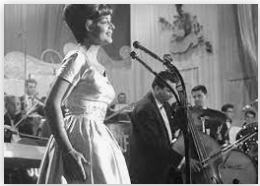How the Eurovision Song contest has evolved.

In the 1950’s the continent of Europe was emerging from the shadows of the most destructive war ever known. Economic deprivation was being relieved by the US Marshal Plan but the scars of the war were still evident. Rubble lined the streets in many areas and the recovery would take some time. What was needed was ways to bring the continent back together and try to heal the divisions. The Fairs Cup and European Football matches was one way, the Formation of the European Coal and Steel community ( the start of the EU) was another. However, it was felt that the Arts was where great strides and cooperation could be made. And so the Eurovision Song contest was duly born.

As with the European Coal and Steel Community it also began life in 1951. The first contest was held in Salerno in Italy. It’s been going on without fail ever since. The only exception being for the COVID19 outbreak of 2020. It started to be regularly televised from 1956 onwards and it is not only the longest running international song contest it is also one of the longest running televised events. Back in the 1950’s you’d need to have very good reception to pick up the pictures from the continent and a TV aerial repair Cheltenham based operation like http://steveunettaerials.co.uk/our-services/aerial-services/tv-aerial-repair/tv-aerial-repair-cheltenham/ would have been as invaluable then as they are know.
The format is very clever. Each country, usually via their state broadcaster, sends a singer or group to perform a song of no longer than 3 minutes. Whichever country is successful gets to host the event the following year. The idea is that the contest allows the country the chance to exhibit themselves as a place of culture and well worth a visit. It also allows for some friendly competition and a chance to share ideas and the shared experience of being European.

Sadly this has not completely worked out to be true. Even from the beginning it was clear that favorites began to emerge. The UK always gave Ireland 10 or 12 points (giving them victory over the UK at decisive moments on several occasions). Cyprus always gave Greece 12 points and Turkey nothing and in one memorable example the Portuguese song was used to signal the start of a military coup.
The situation became even worse after the fall of the Soviet Union. Now all the East European countries could compete. The competition had to be extended to qualifying shows before the usual Saturday night Grand final. This has made it harder of Europe’s fringe countries like the UK and Ireland as they have no neighbours to vote for them. Also The UK leaving the EU has not helped matters. How the Russian entrant will be received this year is also going to be interesting to watch.









